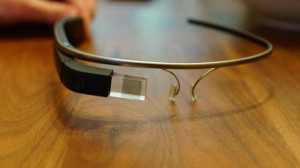The good folks over at Google have invented something truly spectacular—a pair of eyeglasses with a small computer screen mounted on one of the lenses so that the user can have all the advantages of a smartphone without the inconvenience of having to take it out of a pocket and tap a touchscreen. It is called the Glass. At last we can search for cat videos while windsurfing.

As I save my nickels against the expected $1,500 price tag, I note with not a small amount of incredulity that not everyone is looking forward to the Google Glass. The product is still months away from being released to the general public, but already has been banned from a Seattle bar and the roadways of Virginia, on concerns of privacy and distraction, respectively.
Privacy? Distraction?
Think about how wonderful it will be when you can photograph someone in a supermarket without having to pretend to make a phone call, putting the silent phone to your ear and turning sideways, estimating where the lens is focusing, faking your end of a conversation (“Yeah, I know…This is now two weeks they don’t have shredded cabbage”), checking if the photograph was too blurry or if you missed the target, and repeating as necessary without blowing your cover. A person should not have to go through so much work.
With the Google Glass, you can just look at someone and take a photograph. When you see someone wearing white after Labor Day, your friends won’t have to take your word for it. When you’ve sculpted your mashed potatoes into a likeness of Karl Marx, you can take a memento without looking weird in front of the other diners.
And why does the media always emphasize the negative aspects of distraction? Until Google Glass is in stores, if someone is telling you a boring story, you have to pretend to listen by concentrating on the space between their eyebrows or on the way their mouth moves. When you’ve got Google Glass on your eyes, you can read Moby-Dick and when you laugh at the funny parts, the person will think you’re enjoying their story.
Of course establishments that don’t see these advantages and are so obsessed with antiquated notions like privacy will prohibit people from wearing the Google Glass on the premises. The inventors will be forced to conceal the Glass in a better place, like in a person’s hair, or in their nostrils where the Glass could be loaded with a Flonase app during allergy season. Workers will wonder why some patrons are always tilting their heads back and scanning the room with their nostrils, and perhaps think it some new neck exercise.
And when new barriers to the Glass arise, such as hair and nostril searches, or people who are bald or who can’t stop sneezing, Google will have no choice but to locate the Glass where it should have been all along—resting up against our eyes like contact lenses. Everyone will be able to walk around, without any electronics showing, but with a data screen in their field of vision. Like the Terminator.
To take a photograph you’ll need only scratch the side of your face, and a video will start recording at a mere throat clearing. Internet searches can be triggered by just asking a rhetorical question, like “What is gluten anyway?”
And as the photographs and videos and data are uploaded, humanity will finally have what it has been working towards since people started making wedge-like shapes in clay tablets thousands of years ago: One shared brain, under Google, with liberty and justice for all.